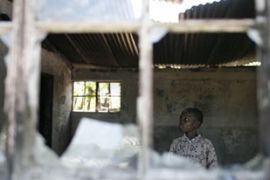New twist in Kenya political crisis
Compromise hopes wane as president and opposition leader harden stands.

Published On 9 Jan 2008
Odinga denounced Kibaki’s actions as “public-relations gimmickry”.
He said Kibaki was trying to divert attention from international mediation to resolve the current crisis in which 500 people have died. “We will not attend the talks on Friday. They are a sideshow,” Odinga said.
Meanwhile, John Kufuor, the Ghanaian president and African Union (AU) chairman, has arrived in Nairobi ostensibly to mediate talks between the two sides.
Cabinet line-up
Against the backdrop of fresh political tensions, Kibaki announced on Tuesday on state TV the line-up for half of his cabinet.
This includes Stephen Kalonzo Musyoka, the leader of ODM Kenya party, in the post of vice-president.
ODM Kenya came a distant third in recent elections.
Andrew Simmons, Al Jazeera’s correspondent in Nairobi, said it was unclear if the creation of a cabinet meant that Kufuor’s attempts at mediation and the possible creation of a government of national unity were now off.
“This is quite an unusual situation. People will have perhaps expected it to have come at a later time,” Simmons said.
“It could be read as being pretty defiant or it could be read as being pretty organised.”
Shifting positions
The shifts in political positions came barely a day after Kibaki extended an invitation to Odinga for face-to-face talks.
| Related | ||||||
|
Odinga had previously made any negotiations conditional on Kibaki acknowledging that the December 27 vote count was rigged.
Diplomatic efforts to resolve the crisis have intensified in recent days, with a number of former African presidents offering to mediate.
Tanzania’s Benjamin Mkapa, Mozambique’s Joachim Chissano, Botswana’s Katumile Masire and Zambia’s Kenneth Kaunda travelled to western Kenya on Tuesday to assess the worst-hit area of post-poll violence before a meeting with Kufuor.
“They will also meet former [Kenyan] president Daniel arap Moi to discuss ways of healing the country and fostering national reconciliation after the problem caused by the elections,” a Kenyan foreign affairs spokesman said.
Economic damage
As the political deadlock continues, Kenya’s finance minister says that the loss to the economy can be recovered within a year.
Amos Kimunya told the Reuters news agency: “I expect whether it’s within the next couple of months or within a year … that people will be able to recoup all that.”
Kenya’s business community says the government is losing two billion shillings ($30.42m) worth of taxes daily due to the unrest.
There has been a gradual return to normality in east Africa’s biggest economy, with currency and stock markets reporting higher volumes as trade resumed in earnest this week.
The weekly tea auction, which also serves Burundi, Uganda, Tanzania and Mozambique among others, resumed on Monday, having been postponed for a week.
The central bank projects Kenya’s economy will grow by eight per cent in 2008, compared with government forecasts of between 6.9 and 7 per cent for 2007.
Source: News Agencies


